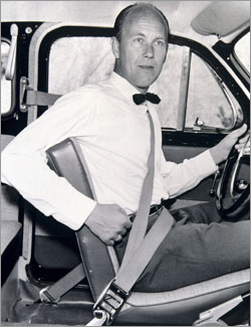 Nils Bohlin (Photo credit: Volvo)
Nils Bohlin (Photo credit: Volvo) There had been versions of seatbelts before this, but Bohlin's was the first three point model. Crucially, he realised the importance of consumer behaviour and adoption - customers want a 'no-brainer' solution. So his design ensured it could be buckled quickly, with just one hand.
And it certainly worked - it is estimated that over 1 million lives have been saved to date and it is considered one of the most important safety inventions of all time. The West German Patent office in 1985 voted it in the top eight patents it had handed out in its first 100 years.
This case raises many interesting questions:
- Why would a company spend significant money on R&D only to give the invention away and not earn any licencing fees?
- Was it completely altruistic or was it actually a long term strategic decision by Volvo?
- Would Volvo make the same decision today in the cut throat market that is the 21st century automotive industry?
Having done some internet searches, I'm surprised how little debate there seems to be about Volvo's decision and the questions above.
Volvo maintains that the reason it gave the technology away was that it was simply too important an invention to profit from - increased revenues just didn't stack up against the lives that could be saved. Volvo realised that consumers would be slower to adopt the technology if it was an expensive optional extra in other cars. I also wonder if the Swedish social welfare model and culture of equality contributed to the decision; had Volvo been in a more Anglo-Saxon country one wonders if the same attitude would have been taken.
On the other hand, was it actually a very shrewd business decision? If you asked 100 people to name the first word that comes to mind when you say 'Volvo', 80-90 would probably say 'safe' (unfortunately for Volvo, the rest would probably say 'boring' or 'box' despite neither really holding true any more!). But this is the point - Volvo's differentiator has always been safety and reliability in the first instance. One of Volvo’s managing directors, Alan Dessell, is quoted as saying: “The decision to release the three-point seat belt patent was visionary and in line with Volvo’s guiding principle of safety.” Judging by the fanfare and PR around the 50th anniversary of the three-point seatbelt, perhaps Volvo realised that releasing the technology would help reinforce and build the brand for years to come. How would people have perceived them if they kept the technology to themselves and squandered the opportunity to save so many lives?
This leads us to the question: would they have done the same today? I'd love to think so but fear they wouldn't. The car industry is much more cut-throat today than it was in the early 60s. Volvo has perpetually lagged behind its main German competitors and a breakthrough invention like this could be a brilliant competition killer in the short term. That leaves an uncomfortable question - why, in the economic system we have, would any CEO sanction giving a major patent away?
I would suggest there are three very good reasons. Firstly, trust in big corporations is at an all time low and a gesture like Volvo's could go some way to restoring confidence - after all, I can think of few more trusted brands than Volvo. Secondly, there is long term brand and ultimately bottom line benefit to be had - especially in today's world of social media and marketing campaigns that can go viral. Finally, as the backlash against short-termism and bonus cultures in big corporations continue, managers are likely to be given longer term targets. Decisions like this, which forfeit short term gain for longer term benefit, will work greatly in favour of managers willing to make them - wider societal benefit will increasingly become part of remuneration.
And a final thought: companies are made up of human beings. Perhaps it was simply a case of the board looking at each other and saying - 'what if it was your kids and spouse in an accident without a 3-point belt?'
by Jesper Ekelund
| | |

 RSS Feed
RSS Feed